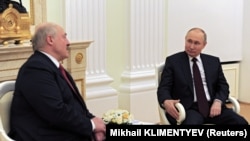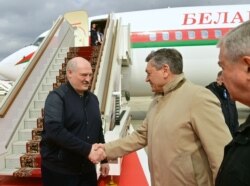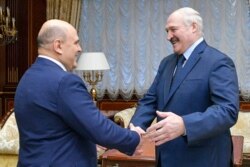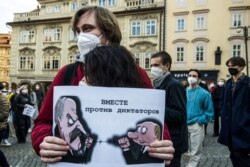On April 22, Russian President Vladimir Putin addressed the Federal Assembly, Russia’s parliament, on a range of domestic and international issues.
On foreign policy, Putin claimed Moscow would defend its interests within the framework of international law. He also repeated past grievances, including the false claim that Western sanctions against Russia for its invasion and occupation of Crimea and other malign activities are illegal.
Putin accused some countries of attempting to impose their will on others by force, a practice that is “degenerating into something much more dangerous.”
“I mean the recently known facts of a direct attempt to organize a coup d'etat in Belarus and the assassination of the President of this country,” he said. “At the same time, it is characteristic that even such flagrant actions are not condemned by the so-called collective West. Simply no one seems to notice this. Everyone pretends that nothing is happening at all.”
Putin’s allegations of a coup and assassination plot against Belarusian President Alexander Lukashenko are unsubstantiated.
On April 17, Russia’s Federal Security Service (FSB) announced it had arrested two men in Moscow for attempting to overthrow the Belarusian government. The suspects were then handed over to Bealrusian authorities.
The men were identified as Alyaksandr Fyaduta, former Lukashenko spokesman turned opposition member, and Yuras Zyankovich, a lawyer with dual Belarusian-U.S. citizenship.
On April 13, Zyankovich’s wife, Alena Dzenisavets, told Radio Free Europe/Radio Liberty that Russian security forces had “abducted” her husband from the Nordic Rooms Hotel in Moscow two days earlier and transported him to Belarus.
The FSB claimed it received information from its Belarusian counterpart, the KGB, that the plot was discussed with other opposition members and former security officials last summer via Zoom chats.
According to the FSB, Zyankovich carried out “consultations in the U.S. and Poland” before meeting with Fyaduta in a Moscow restaurant to discuss the plot, Russia’s TASS news agency reported.
The plot, to be carried out in conjunction with “Belarusian generals,” allegedly involved seizing radio and television stations and obstructing security forces loyal to the state.
“They were preparing a blackout of the Belarusian power grid to hamper the actions of the army and law enforcement agencies. Some armed groups (guerillas) located at hidden bases were supposed to launch an active phase,” TASS cited the FSB as saying.
The alleged coup was scheduled to coincide with the Victory Day Parade in Minsk on May 9, a day which holds deep emotional resonance in Belarus and Russia.
Two other men were arrested in Belarus in connection with the plot.
One of them, Ryhor Kastusiou, leads the Belarusian People’s Front (BPF) party and ran for president. He was arrested on April 11. His son-in-law Zmitser Antonchyk was detained on April 13. But Belsat TV, a Poland-based channel focused on Belarus, told Polygraph.info he had only been interrogated, not arrested.
According to unconfirmed reports, another alleged plotter is Volha Halubovich, Yury Zyankovich's assistant in Belarus.
A senior KGB official said the plotters are being charged with conspiracy to unconstitutionally seize state power and face up to 12 years in prison.
The KGB claimed every stage of the alleged plot was recorded, “including by technical equipment.” However, none of that information has been released.
On April 17, Lukashenko claimed, without evidence, that the plot was orchestrated by “the top political leadership” in the U.S. and included plans to murder his sons.
He said the plot was likely organized by “the Central Intelligence Agency” or “the FBI,” adding: “I do not know which of the American services worked here.”
Russian presidential spokesman Dmitry Peskov said that Putin had raised the issue with U.S. President Joe Biden during an April 19 telephone call between the two leaders. Peskov declined to comment when asked if the Biden administration was involved in the alleged plot.
The U.S. State Department said allegations of U.S. involvement in any such plot were “absolutely false.” Polish presidential minister Krzysztof Szczerski said anyone accusing Poland of involvement in the alleged plot “is lying.”
Belarusian opposition leader Svyatlana Tsikhanouskaya said the alleged plot “has signs of provocation by the intelligence services of Russia and Belarus.”
Other experts agree.
Artyom Shraibman, a Belarusian political analyst and journalist, told Germany’s public broadcaster Deutsche Welle (DW) that the alleged plot is nothing more than a “banal” special service operation to implicate the Lukashenko opposition in a “fictitious conspiracy” as a pretext to arrest them.
According to Shraibman, the alleged culprits were willing participants in the plot, unaware it was a sting operation.
Belarusian political scientist Dmitry Bolkunets offered a similar analysis:
“People were deliberately introduced into this game, and because of their incompetence they believed everything. In authoritarian countries, power never changes through elections – there is always either a revolution or military coups, and Lukashenko knows this very well.
“Apparently taking advantage of this situation, the KGB of Belarus decided to involve the opposition in these actions and show that it was preparing a rebellion. At the same time, the opposition does not have any resources for such actions,” Bolkunets told DW.
He added that the authorities likely tried to implicate many other opposition figures.
Brian Whitmore, a nonresident senior fellow at the Atlantic Council’s Eurasia Center, noted that the plot comes at a time when Russia is “visibly expanding” its footprint in Belarus.
“At the most basic level, claims of a U.S.-backed coup advance Moscow’s goal of increasing Belarusian isolation from the West and increasing its dependence on Russia,” Whitmore said. He added it sends the “unambiguous message” to Lukashenko that he is “in Russia’s sphere of influence” and has nowhere else to turn, a message “Lukashenko appears to have received the message loud and clear.”
More broadly, Whitmore says, it provides Moscow cover to establish its own “whaboutism narratives” at a time when Russia has been massing troops on Ukraine’s borders and was implicated in various plots, including the SolarWinds hack of U.S. government agencies and businesses and the alleged participation of Russian agents in blowing up a Czech ammo depot in 2014.
The coup allegation comes as the embattled Belarusian president faces the greatest challenge to his 26-year rule, with the mass protests that erupted following rigged elections in August 2020 leading to an increasingly draconian state crackdown on the opposition.
Lukashenko is no stranger to phony allegations of coups and other malign foreign actions.
As noted by DW, he has alleged seven coup attempts against him since 1994, including a purported July 2020 plot by Russian mercenaries to "destabilize the situation during the election campaign.”
As Polygraph.info and others have reported, Lukashenko has falsely accused Poland of planning to annex part of Belarus; NATO of plotting to seize Belarusian territory and create a buffer between Belarus and Russia; and Western governments attempting to stage a “Color Revolution” to topple him.
Lukashenko has even accused Russia of seeking to incorporate Belarus, or unleash a war in the country, “like in Ukraine.”









